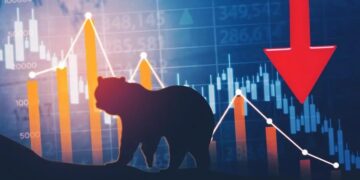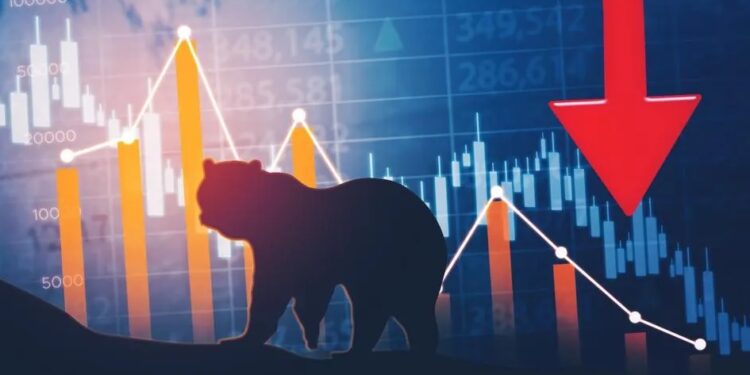By John Ikani
Wall Street is in turmoil today as growing concerns about a U.S. economic slowdown trigger a fresh wave of selling across global financial markets. The S&P 500 is down 2.4% in afternoon trading, while the Dow Jones Industrial Average is plummeting by 864 points, or 2.2%. The Nasdaq Composite is also under pressure, shedding 2.8%.
These declines mark the latest chapter in a global sell-off that erupted last week. Tokyo’s Nikkei 225 led the charge today, collapsing 12.4% for its worst day since the infamous Black Monday crash of 1987.
Traders in Tokyo reacted to Friday’s disappointing U.S. jobs report, which revealed a much sharper slowdown in hiring than expected. This data, coupled with other weak economic indicators, has fueled fears that the Federal Reserve’s aggressive interest rate hikes are stifling growth.
While some market experts warn that technical factors may be exacerbating the market’s volatility, the losses are undeniably severe. South Korea’s Kospi index is down 8.8%, European stock markets are falling by over 1%, and even bitcoin has dropped below $55,000 from Friday’s level of over $61,000.
Gold, traditionally seen as a safe-haven asset during turbulent times, has also declined by 1%. This suggests that investors are bracing for a potential interest rate cut by the Federal Reserve, even before its scheduled meeting on September 18. The yield on the two-year Treasury bond, a key indicator of Fed expectations, briefly dipped below 3.70% from 3.88% on Friday.
Brian Jacobsen, chief economist at Annex Wealth Management, cautions against expecting an emergency rate cut. “The Fed could ride in on a white horse to save the day with a big rate cut, but the case for an inter-meeting cut seems flimsy,” he said. “Those are usually reserved for emergencies, like COVID, and an unemployment rate of 4.3% doesn’t really seem like an emergency.”
Although a recession is far from certain, the U.S. economy faces growing headwinds. The Fed’s delicate balancing act between taming inflation and avoiding a downturn is becoming increasingly challenging. Goldman Sachs economist David Mericle now sees a 25% chance of a recession within the next 12 months, up from 15% previously.
Some analysts believe the market’s recent decline is a correction after a prolonged rally fueled by artificial intelligence hype and expectations of interest rate cuts. The stock market had become overvalued, according to critics.
JJ Kinahan, CEO of IG North America, attributes the market’s woes to fading AI euphoria and over-optimism. “Markets tend to move higher like they’re climbing stairs, and they go down like they’re falling out a window,” he said.
The Bank of Japan’s decision to raise interest rates last week has also contributed to market volatility. This move strengthens the yen but could force investors to unwind complex trading strategies.
While a report on U.S. service sector growth provided some temporary relief, fears of a slowdown continue to dominate. The Russell 2000 index, which tracks small-cap companies, is down 2.8%, reflecting concerns about economic weakness.
Big Tech stocks, which have been market darlings, are also suffering. Apple, Nvidia, and other “Magnificent Seven” companies have propelled the S&P 500 to record highs but are now facing headwinds. Apple is down 3.9% after Warren Buffett’s Berkshire Hathaway reduced its stake, while Nvidia has plunged 5.5% amid concerns about its new AI chip.
The dominance of these tech giants means their performance has a significant impact on overall market indexes.
Beyond economic factors, geopolitical tensions and the upcoming U.S. elections are adding to market uncertainty. The Israel-Hamas war and potential global hotspots are creating anxiety, while investors are also watching how election outcomes could shape economic policies.
The threat of a recession could impact both the presidential election and the Federal Reserve’s monetary policy. A strong jobs market is crucial for consumer spending and economic growth, making employment a key focus for policymakers and voters alike.




































